Pregnancy is one of those phases where women go through a life-changing experience. There is a reason why people say think twice before you decide to be a mum or dad, because it is an extremely arduous job; from the beginning till the end. Becoming a mother is never easy, don’t trust anyone who says anything otherwise. From the moment you decide to become a mother, your life seems like it has become quite a task.
Not saying that it is in any way bad, or not belittling the concept of motherhood, because motherhood is perhaps one of the most enlightening phases of a woman’s life. Motherhood is celebrated everywhere because it does not come easy, nurturing a baby within you and then taking such great risks in delivering the baby, taking care of the baby, and bringing up the child is one of the most difficult jobs in the world.

Therefore, motherhood is considered almost sacred; it is a job like no other in the world.
Growing Concerns During Pregnancy
From the day you know you are pregnant, everything you do, every step you take, has a degree of caution to it. You stop being careless and let go of all frivolity, you start being more cautious, being sensitive about everything you eat, drink, wear, and everything that you do has some thought going into it. The reason is that you don’t want anything to happen to that little baby that is growing inside of you.
This is why, when you are pregnant, you start being particular about the diet that you take, ensure you don’t eat things not good for you, and eat more healthy food. However, there is one food staple that nearly all women consume on a daily basis and naturally, they have a craving for it during pregnancy as well; tea (or coffee).
The Origin of Tea
Tea has been a part of food sustenance for the longest time ever. The first tea which was most likely consumed in the world dates back to around 2700 BC in Ancient China. China was perhaps the first country to start consuming tea and by the 3rd century, tea was used in every household and was being consumed in the entire country. From there, the popularity of this drink began and people all over the world got addicted to it.
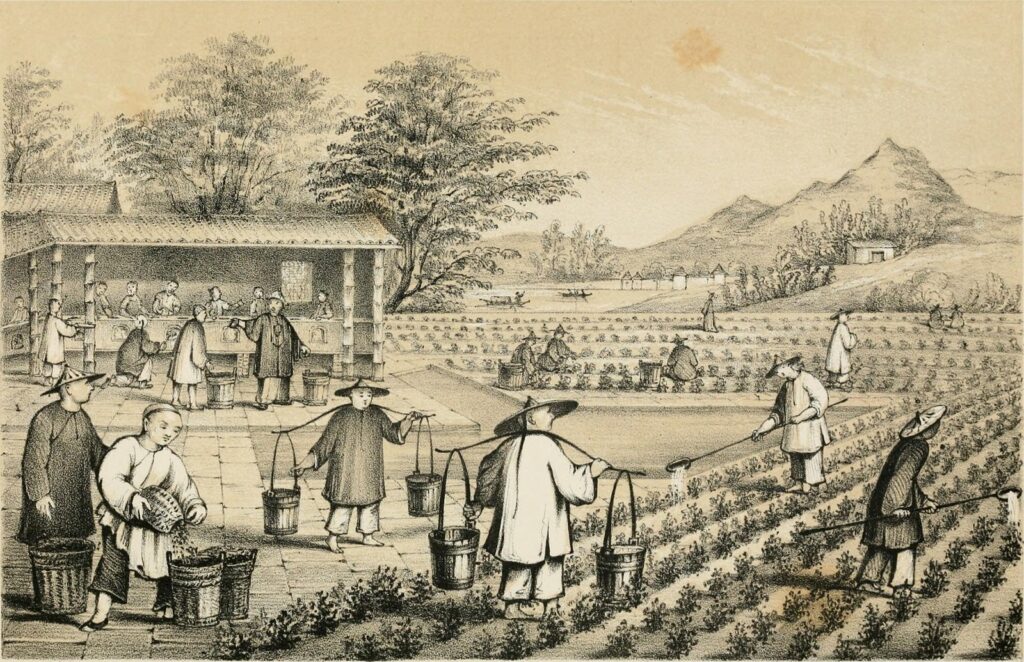
Tea, in the earliest years, was just a few herbs that were steeped in boiling water and brewed, this changed the color and taste of boiled water and made it delectable. In the beginning, tea was used as a medicinal drink and claimed to have medicinal properties. Later on, it became an everyday drink.
Making and consuming tea is like an everyday ritual for people. It is also an important part culturally and many people ‘meet over tea’ as well. Nowadays, tea comes in a million different forms and is made with different herbs or leaves, all having different properties.
The Benefits of Tea
Tea has numerous benefits, which is probably why people all over the world drink tea every day. Some of the benefits of tea are:
- Helps with anxiety and sleep issues
- The polyphenols which are antioxidants present in tea help with inflammation
- Great for curing constipation
- Helps relax the body and freshen the mind in the morning
- Helps alleviate headaches
- Improves blood pressure
- Helps with overall mental health
However, there are many new variants in the markets that should be avoided, such as teas with a high sugar content, teas that are not regulated before production, or detox or diet teas that claim to help you lose weight. All of these teas are not good for you and should be avoided, especially if you are pregnant.
Is It Safe to Drink Tea During Pregnancy?
Pregnancy and tea have gone hand in hand for a long time. Tea, much like any other beverage, is something women are used to having nearly every day (the same can be said for coffee) and it seems like a completely safe drink to have, so safe that you have it every day, sometimes 3-4 times a day. So, the question arises only when women are pregnant, can they have tea during pregnancy?

The purpose of the question lies solely in the fact that tea (or coffee) has a substance called caffeine. Caffeine is a natural stimulant found in tea and coffee and helps increase the activity of the brain and nervous system, and tea helps relax and refresh your mind.
Although it is okay to have a certain amount of caffeine every day, it is during pregnancy that high doses of caffeine are to be avoided.
Risks of Having Caffeine in Pregnancy
Caffeine is always advised to be used in moderation if you are pregnant. There are a few risks that caffeine imposes on your unborn child, in medical terms, known as the fetus. Some of the risks are:
- Increased chances of miscarriage
- Low birth weight
- Constricting blood vessels in the uterus to the placenta would lead to a low blood supply to the fetus
- Inhibit fetal development
- Irritability and restlessness during pregnancy
- Increased heartburn during pregnancy
The recommended daily dose of caffeine for pregnant and breastfeeding moms is around 200 mg.
The problem, however, is that most women have a habit of drinking tea and it is very difficult to let go of such strong habits so easily. The best alternative that women can opt for, to curb their tea cravings during pregnancy is to have organic pregnancy tea.
What is Organic Pregnancy Tea?
Organic pregnancy tea, as the name suggests, is a healthier version of tea. It mostly comprises herbal teas and is organic, which means it is closer to nature and is more healthy to consume. Organic tea is a blend of herbal or naturally derived tea, which has a zero or low caffeine content. It is a healthier alternative for pregnant women and does not impose the risks brought forth by high doses of caffeine.
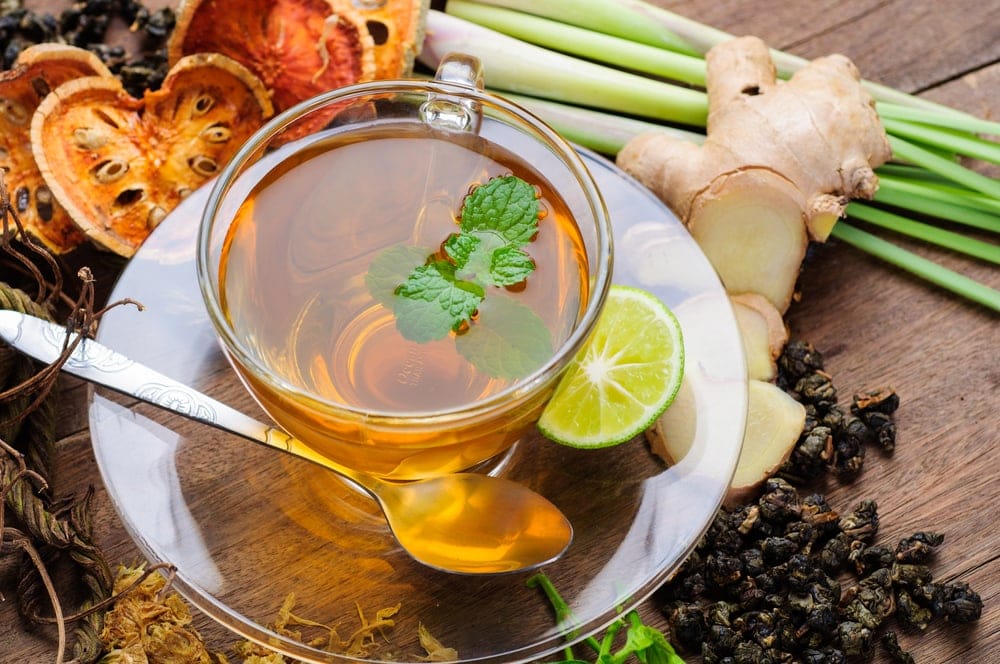
Organic pregnancy tea is generally for those women who love having a cuppa every day and those who really need that early morning kick before starting their day but don’t want to have their usual tea because of the high caffeine that it has.
Some people who have decaf (decaffeinated) tea or coffee also prefer organic pregnancy or herbal tea during their pregnancy phase as this is milder, has other additional benefits that they can avail, and also because organic teas are smooth concoctions that just go down your throat and go directly in your soul. They are a subtle blend of flavors that are lighter and more soothing for your pregnant body.
Types of Organic Pregnancy Tea
When it comes to choosing tea, there are several different types to choose from. Tea can be bought based on its origin of harvest; such as Ceylon tea, oolong tea, Darjeeling, matcha, Assam, etc. Tea is also classified into drinking groups, such as yellow tea, black tea, white tea, green tea, etc.
Most herbal teas which are caffeine free are named after the plant they are derived from, such as chamomile tea, hibiscus tea, peppermint tea, raspberry tea, lemongrass tea, jasmine tea, cardamom tea, rooibos tea, etc.
Organic pregnancy tea is a specific sub-group within tea itself. This type of tea is generally naturally caffeine-free which means that caffeine is not artificially extracted out of it, its natural formula has no, or very little caffeine content in it. There are many different versions of pregnancy tea and all of them cater to different needs of the hour, some of the most commonly used herbs/plants are:
Raspberry Leaf
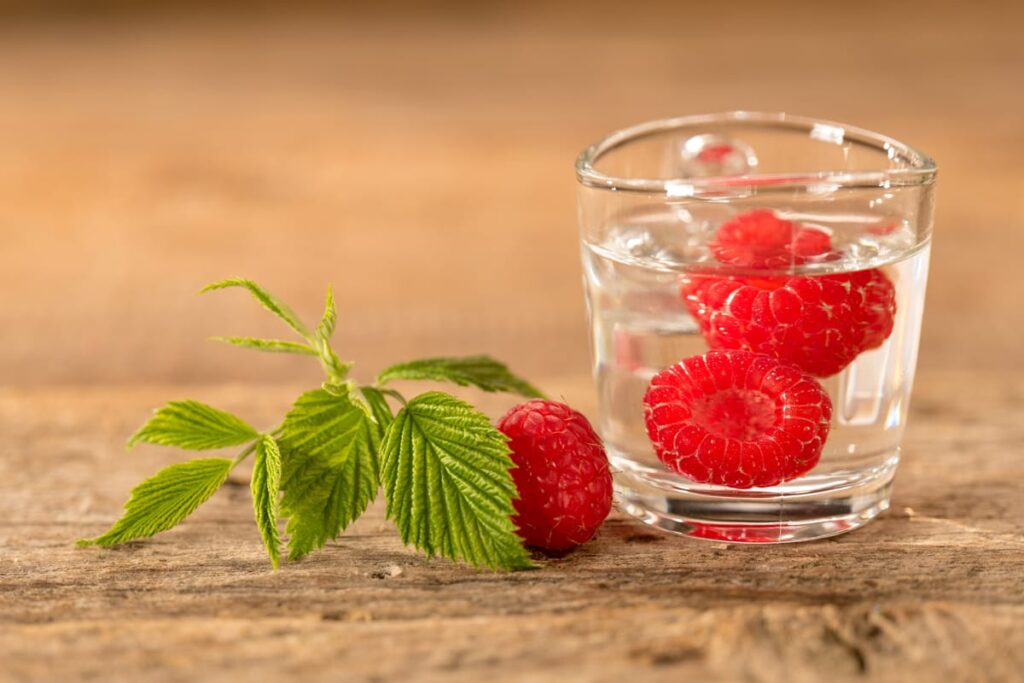
Raspberry leaf tea originated in Europe, but due to its nutritional value, it started being used all over the world. Naturally, raspberries are sweet berries, so the leaf also has a mildly sweet taste. The tea is derived by drying the leaves and then brewing them in water. Raspberry leaf is known to be full of antioxidants which is an excellent herbal remedy for many ailments.
Raspberry leaf tea is generally used for PMS but it is also widely used during pregnancy as it helps induce labor and shortens the length of labor which makes your delivery quicker and easier. It is also known to strengthen the uterus but not a lot of research has been done in this regard.
However, raspberry leaf is also a laxative and can cause diarrhea if used in abundance. It is generally used in the later stages of pregnancy when labor needs to be stimulated.
Rooibos
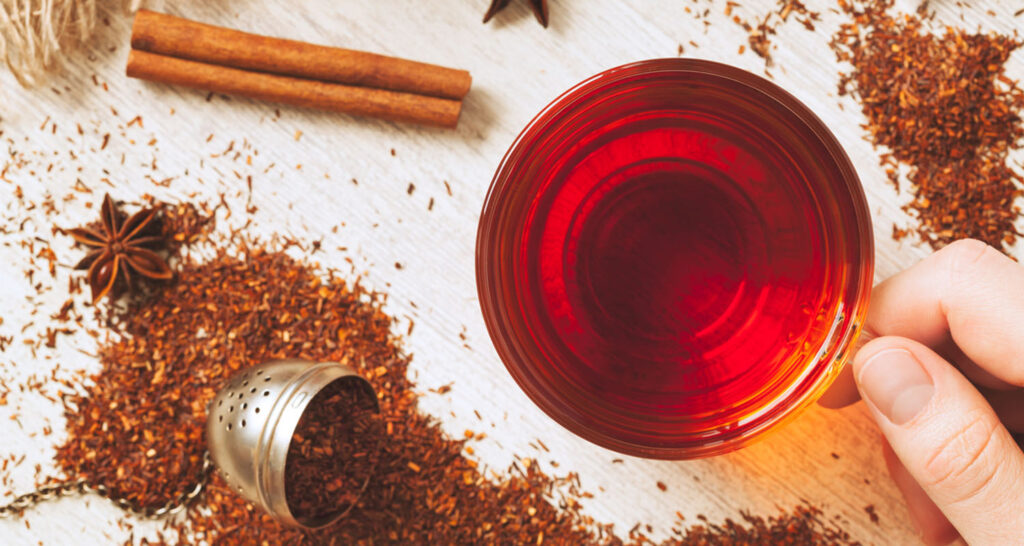
Rooibos tea is an absolutely safe organic pregnancy tea and is considered the best herbal alternative to black or green tea. Rooibos is a plant that originated in South Africa, with sweet caramel and vanilla undertones of flavor, it quickly became a favorite of pregnant women throughout the world because of its taste, benefits, and safety.
Rooibos is jam-packed with antioxidants and is a great stress reliever as well. People claim that it is great for helping with morning sickness and nausea.
Elderberry

Elderberry is a sort of berry that is derived from the Elder plant that grows all over Europe. Having earthy and tarty undertones of flavor, it is a fairly famous plant and people all over the world use it. Elderberry tea is widely used for protection against colds and coughs, and it has great immune-boosting elements. It is full of polyphenols and has a lot of antioxidants in it.
Peppermint
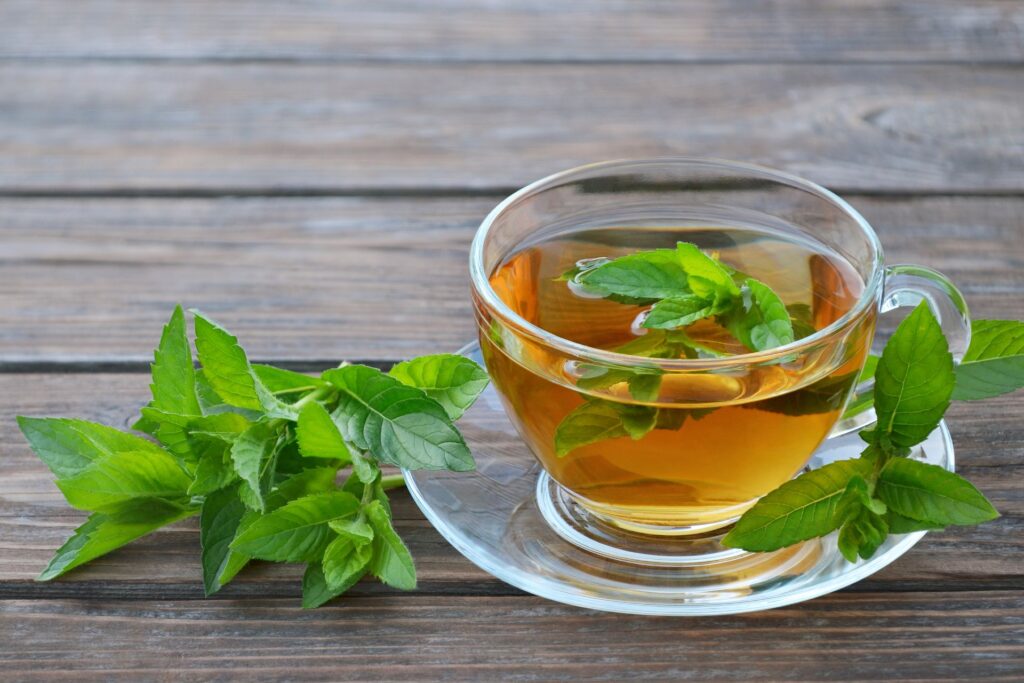
Peppermint comes from the indigenous family of mint, which is used all around the globe. Peppermint has a refreshing flavor and is often a core ingredient in mouth fresheners and stomach coolers. Peppermint tea is one of the most widely used herbal tea in pregnancy, as it helps relieve indigestion and cure heartburn.
It makes the breath nice and minty and helps with nausea and also flatulence (wind) so people who are gassy, will find solace in peppermint tea.
Ginger
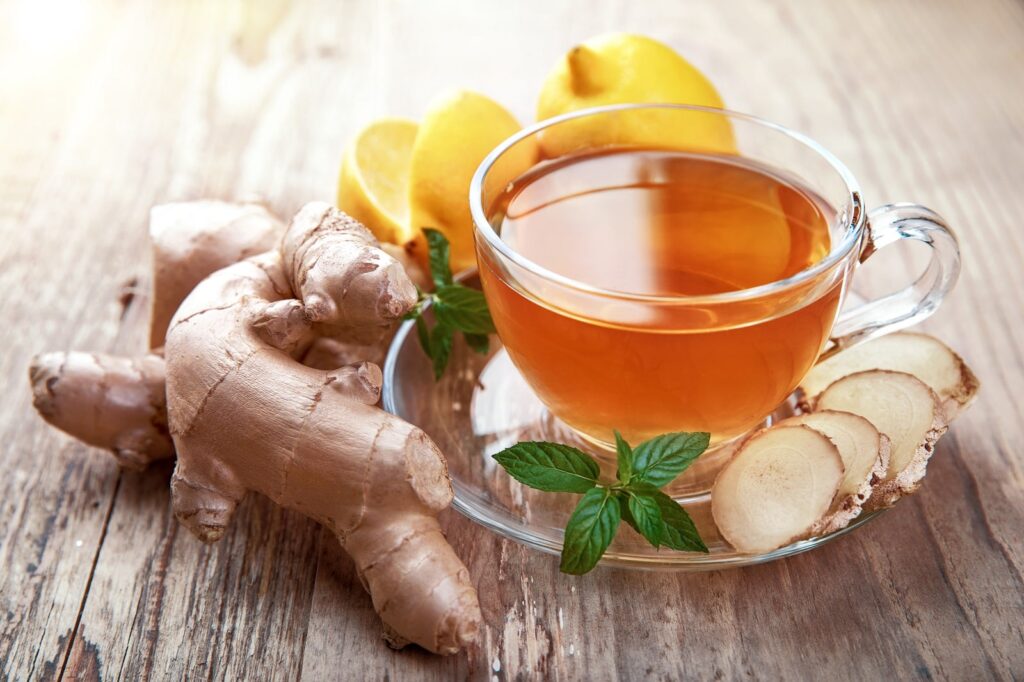
Ginger has been used medicinally throughout different parts of Asia for a long time. Ginger has been one of the core ingredients in many herbal medicines. It has a light spicy and sharp flavor and ginger tea is often used in winter, to ward off cough and cold.
Ginger tea in pregnancy is used to get relief from morning sickness, it helps alleviates pains and inflammation and helps with overall gut health.
Chamomile
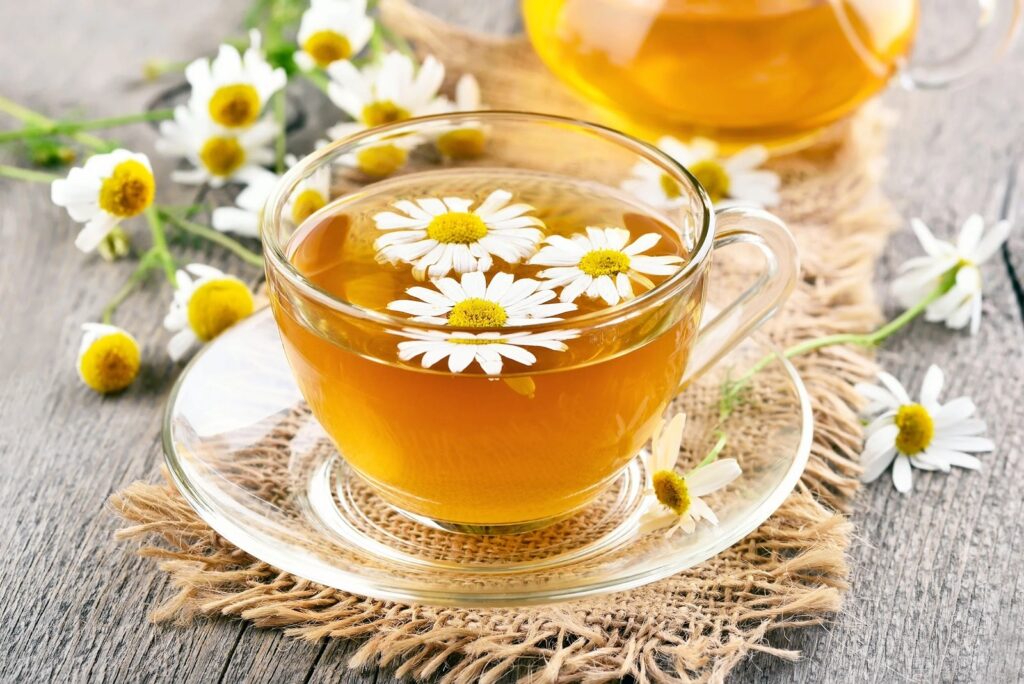
Chamomile is a daisy-like plant that is found all over the world. The word chamomile is almost synonymous with stress relief. Nearly all medicines that provide relief from stress and anxiety have chamomile in them, whether they are herbal, allopathic, homeopathic, or any other medicine.
Chamomile tea is a great body relaxer and helps calm nerves and ward off anxiety which might kick in towards the end of your pregnancy. However, chamomile tea should be consumed in moderation (one or two cups a day) and a higher dosage could create complications.
Fennel
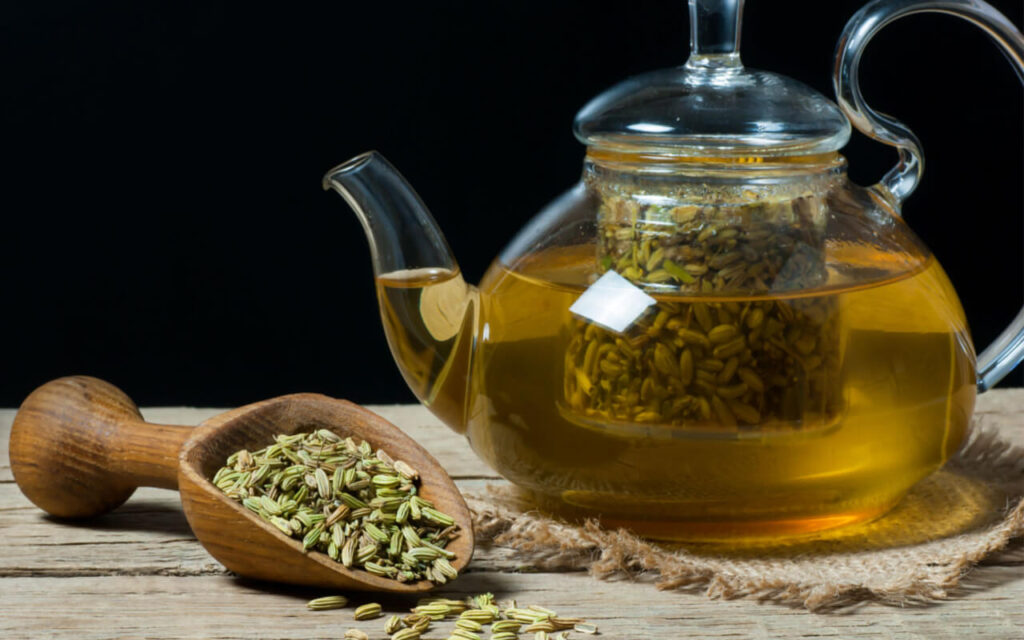
Fennel is a spice often used in foods for a light and refreshing flavor. Fennel tea is famous for boosting lactation as it has elements that increase milk supply, it is a great source of hydration and also helps ease postpartum swelling.
Honeybush
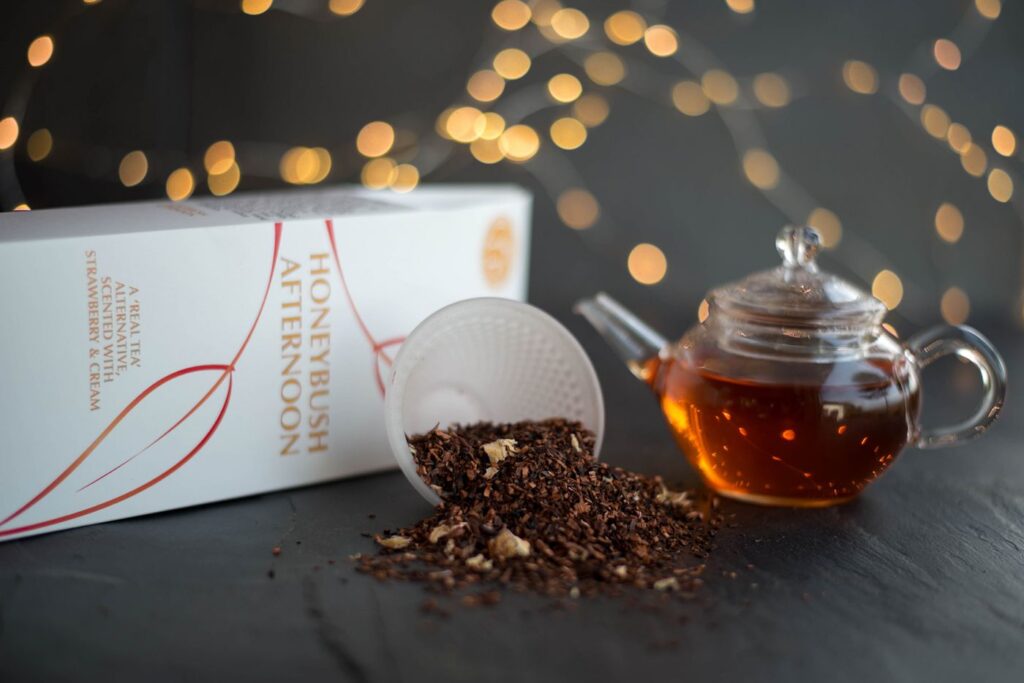
Honeybush tea, or mountain tea is a variant of Rooibos tea and comes under the category of ‘red tea’. It is a naturally sweet-tasting tea packed with antioxidants and anthrocyanins which prove to be fruitful during pregnancy.
It is quickly garnering fame across the world for being safe to use during pregnancy and for its immense benefits.
Should I Drink Organic Pregnancy Tea?
Tea is a beverage that can be consumed hot or cold, and during pregnancy, when you are supposed to cut down on caffeine, on fizzy drinks, carbonated drinks are not allowed and sugary drinks are to be avoided, tea proves to be a solace in disguise as it can be had as a hot drink or iced tea can be consumed when you are feeling hot.
There are many benefits of organic tea and a few risks as well. There are a few things to keep in mind if you decide to consume tea as your staple beverage throughout your pregnancy.
Benefits of Having Organic Pregnancy Tea
There are several benefits that organic pregnancy tea will provide to you. When used as recommended, and in moderation, organic tea will help with the following:
- Soothing and calming you – pregnancy tea will help relax your mind and body during pregnancy, help you sleep better, curb anxiety that kicks in the later stages of pregnancy, and calm your nerves as the third trimester progresses.
- Pregnancy sickness – pregnancy teas are great for easing morning sickness, nausea, and vomiting, reducing heartburn and digestion, and helping with bloating, and also great for people who are gassy and help with preeclampsia.
- Labor – a few variants of organic teas help induce labor and stimulate it in order for a steady delivery process.
- Postpartum – organic tea is great for postpartum blues, it helps calm your nerves and body after delivery and soothes your senses. Some types of teas also help with lactation and improve milk supply.
Risks of Having Organic Pregnancy Tea
Like everything else in this world, tea, which is beneficial for us in so many ways, also imposes a few risks that cannot be overlooked. The risks usually kick in when you overdose on tea or by having tea that is not recommended for you at the time. For example, if you start having labor-inducing tea in the first trimester, of course, the chances of miscarriage will increase.
That is why it is said to first read about the different types of organic pregnancy tea before consuming it. The risks involved with having organic pregnancy tea include:
- Early miscarriage
- Early or preterm labor
- Diarrhea
- Restriction of fetal growth
- Low birth-weight
Things to Keep in Mind
There are a few things you should keep in mind in order to avoid the risks that tea imposes during pregnancy. If you keep the following things in mind, you will be able to consume tea without it being dangerous for you. Some of them are:
- Talk to your Ob-Gyn and take advice/recommendations regarding drinking tea and the types of tea to take during pregnancy.
- Make sure you are not allergic to any herb which might cause issues for you.
- Ensure that the tea you are consuming is FDA approved as there are many brands that are not regulated and are unapproved.
- If you are having caffeinated tea, make sure you stay within the daily caffeine limit, which is around 200 mg. This would be around 4 cups of tea as each cup has around 40-50 mg of caffeine. It would be better to stick to a maximum of around 2 cups.
- It is better to have organic pregnancy tea instead of caffeinated tea as the organic ones are caffeine-free usually.
- You should know which tea to have at what stage of pregnancy. For e.g. do not take raspberry tea leaf in the first trimester.
When Should I Have Organic Pregnancy Tea?
Organic pregnancy tea, if they are FDA approved, can be consumed daily during your pregnancy phase. However, you should know not to exceed the daily limit, even if the tea is caffeine-free, it is suggested to have 1-2 or a maximum of 3 cups a day, as that is enough for your body. You should ensure you know which types of tea are consumed at what stage of pregnancy, so make sure you don’t get confused.

The most effective and comprehensible way is to divide your pregnancy timeline trimester-wise and so divide your tea accordingly as well.
First Trimester
The first trimester is the first three months of your pregnancy, or the first 12 weeks of being pregnant. This phase is the early pregnancy phase where you don’t really see a pregnancy bump so evidently and you don’t have backaches or pains starting yet. However, the first trimester is difficult because of the seemingly never-ending morning sickness and nausea that it brings.
Morning sickness or nausea is caused by the hormonal changes that occur in your body and lower blood sugar levels as well, it is a way of telling your body that something is changing. Some of the best organic pregnancy tea options for the first trimester would be those which have elderberry, ginger, peppermint, or rooibos.
Some of the best-selling brands in this category are Earth Mama Ginger Nausea Tea, Traditional Medicinals Peppermint Tea, Numi Rooibos Tea, Pink Stork Morning Sickness Tea, Zhivana Organics Elderflower Tea, Bamboobies Morning Sickness Relief Tea, and many others.
Second Trimester
The second trimester is the 4th to 6th month of your pregnancy. This is when the morning sickness may have diminished (or maybe not) but there are many other problems, such as heartburn, acidity, backaches, and whatnot that have arisen. The best options to go for during this time would be tea that has peppermint which will help with heartburn, rooibos, or ginger.
Zhivana Organics Peppermint Tea, Traditional Medicinals Lemon Ginger Tea, and Numi Rooibos Tea are good options for this time.
Third Trimester
The third trimester is when you start gearing for delivery, and is the last mile of your pregnancy which is the 7th to the 9th month of pregnancy. Restlessness, anxiety, and sleep deprivation are usual issues during this time. During this time, it is best to have Raspberry Leaf tea for quicker labor and for inducing labor as well, and chamomile tea for better sleep.
Traditional Medicinals Raspberry Leaf Tea and Earth Mama Chamomile Tea, Earth Mama Third Trimester Tea are some of the best organic teas available for your third trimester.
Postpartum & Breastfeeding
After you have delivered the baby, the biggest concern every mama has is about lactation and low milk supply. During this time, it is advisable to have fennel and fenugreek as these are considered great for lactation. Hipp Herbal Nursing Tea and Traditional Medicinals Organic Mother’s Milk Tea are the most sought-after options.
Once you are done breastfeeding your child and are trying to wean him off, you will also need to decrease your milk supply and for that Earth Mama’s No More Milk Tea would be your go-to option.
Fertility
If you have not conceived and are planning to conceive a child, or having trouble conceiving, along with getting your due appointments with the doctor, it is also good to follow organic and herbal remedies for conception, and Secrets of Tea Fertility Tea is a great option and is safe to consume and you can see if it works.
The Best Way to Have Organic Pregnancy Tea
The best and most advisable way to have tea is to, first of all, have it in moderation, a maximum of 3 cups a day. If the tea is in the form of tea bags, then put the tea bag in a cup, add hot water, leave the bag in for 2-3 minutes to steep the tea, and then enjoy. You can sweeten the tea if you want with plant-based sweeteners, as consuming too much sugar is not good during pregnancy.
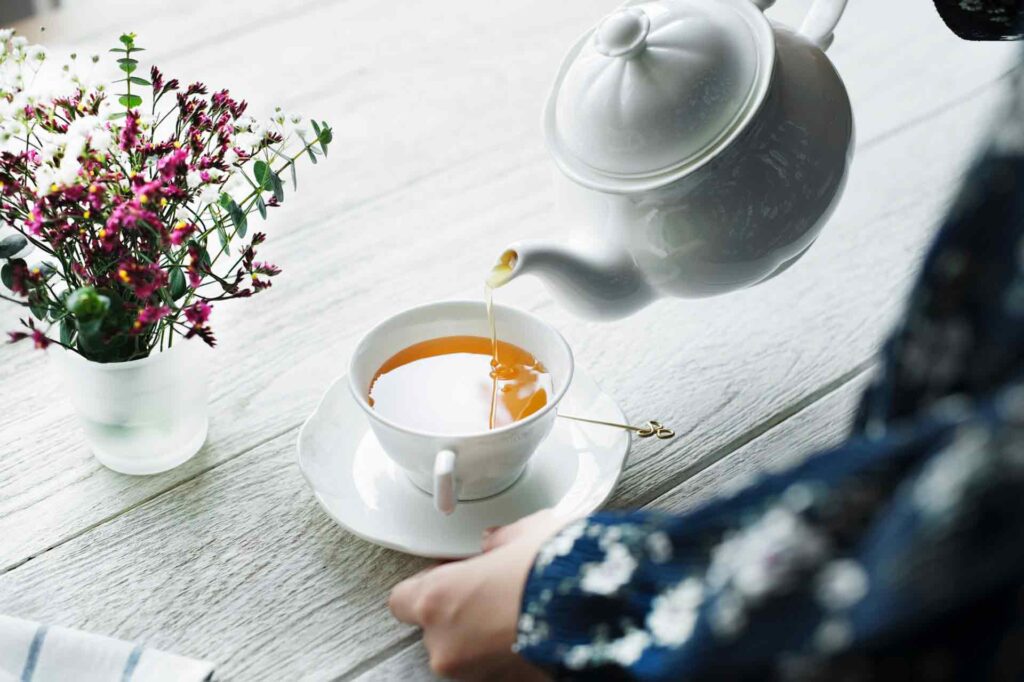
If the tea is in the form of leaves then boil water, and add tea leaves, steep for a few minutes till you get a golden or golden-brown color, don’t make it too dark or the tea will taste bitter, then strain the tea in a cup and sip away.
Conclusion
Drinking tea is an ancient practice, one that has been transferred down generations and has embedded deeply in cultures. There are many people who can’t go about their day if they haven’t had their morning tea and tea plays an important role in our gastronomic lives.
This is the reason why it gets a little difficult when people say to cut down on tea during pregnancy because the habit is old and strong. For this reason, and to also keep away from caffeinated drinks during this time, organic pregnancy tea has proved to be a knight in shining armor.
For people who can’t live without tea, and so wonder how they will go about their day without tea, you don’t need to worry, organic teas will prove to be effective and calming throughout your pregnancy journey. Just keep in mind not to have too much of it.
